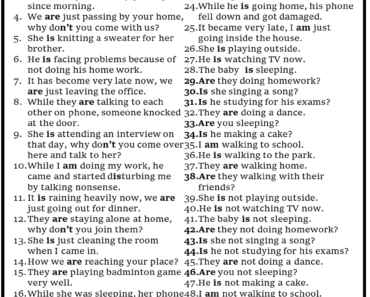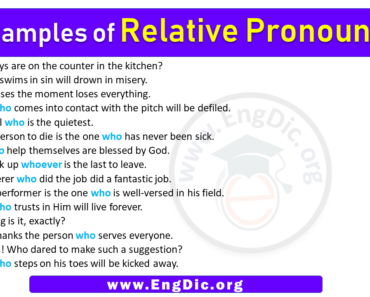Absolute phrases are an important tool for any writer, as they add emphasis and provide additional contextual information. They are sometimes referred to as ‘nominative’ or ‘nominal’ phrases and consist of independent clauses with a participle or a gerund in them. In this article, we will look at 20 examples of absolute phrases to help demonstrate how they can be used in context.
An absolute phrase is a group of words that serves as an adjective or adverb. It starts with a preposition, which can be “of”, “in”, or “for”. The absolute phrase can modify a noun, be the object of a verb, or follow an adverb.
Function Of Absolute Phrase
The absolute phrase serves to provide additional information about the main clause, usually emphasizing a specific aspect of the subject, time, condition, or action described in the sentence. Here are some of the functions of the absolute phrase:
- Modifier: The absolute phrase modifies the entire sentence, not just a single noun or verb, adding more information or description to the sentence.
- Emphasis: The absolute phrase emphasizes the importance of the action, time, or condition mentioned in the main clause, often by describing it in more detail.
- Clarity: The absolute phrase adds clarity to the sentence, making the relationship between the subject and the action or condition clearer.
- Transition: The absolute phrase can also be used to transition from one idea or action to another in the sentence, providing a smooth and effective flow of thought.
- Stylistic effect: The absolute phrase can add a stylistic effect to a sentence, making it more interesting and engaging to read.
How To Identify Absolute Phrases?
Here are some steps to help identify absolute phrases in a sentence:
- Look for a noun or pronoun: Absolute phrases always start with a noun or pronoun in the nominative case.
- Identify the participle: The noun or pronoun in the absolute phrase is usually followed by a participle that ends in -ing, -ed, or -en.
- Look for modifiers: Absolute phrases often have modifiers that describe the noun or pronoun in more detail.
- Check for comma placement: Absolute phrases are usually set off from the rest of the sentence by a comma, which can help you identify them.
- Determine the function: Determine how the absolute phrase is functioning in the sentence, whether it is providing additional information, adding emphasis, or serving some other purpose.
For example, in the sentence “The sun having set, the night grew colder,” “the sun having set” is the absolute phrase. It starts with the noun “sun” in the nominative case, followed by the participle “having set” and is separated from the main clause by a comma. It provides additional information about the time and condition in the sentence.
20 Examples of Absolute Phrases
- The clock ticking away, she tried to focus on her work.
- The food cooking in the oven, the delicious aroma filled the room.
- The flowers in full bloom, the garden was a riot of colors.
- The train whistling in the distance, we hurried to the platform.
- The exam over, the students breathed a collective sigh of relief.
- The wind howling through the trees, we huddled around the campfire for warmth.
- The rain pouring down, we rushed to find shelter.
- The laptop battery dying, he saved his work and plugged it in.
- The audience cheering loudly, the band played their final song.
- The project completed ahead of schedule, the team celebrated with a round of high-fives.
- The storm having passed, we ventured outside.
- The game won, the team celebrated with a victory lap.
- The sun having set, the night grew colder.
- His arms crossed, he glared at me.
- The party in full swing, I decided to leave.
- The children, their faces bright with excitement, eagerly opened their presents.
- My heart pounding, I approached the podium to give my speech.
- Her eyes fixed on the horizon, she waited for the sun to rise.
- The book read, I put it down and turned off the light.
- The car parked in the garage, we walked home.
Nominative Absolute Examples
A nominative absolute is a type of absolute phrase that includes a noun or pronoun in the nominative case (i.e., the subject case), followed by a participle and any associated modifiers. The nominative absolute phrase provides additional information about the subject or the action of the main clause.
Here are some examples of nominative absolute phrases:
- The sun having risen, we set off on our hike.
- The meal finished, we cleared the table and washed the dishes.
- The game won, the players high-fived each other and hugged their coach.
- The clock ticking, time seemed to move so slowly.
- The baby asleep, we tiptoed around the house so as not to wake her.
- The children playing in the park, the parents chatted on a nearby bench.
- The rain pouring down, we ran to our car and quickly got inside.
- The team ready and focused, they took to the field with confidence.
- The house quiet and still, she settled in for a peaceful evening at home.
- The crowd excited and cheering, the performer took the stage with a huge smile.
Absolute Examples In Literature
Here are two examples of absolute phrases in literature:
1. “The evening star, that rose above the hills, twinkled bright and clear.” – John Milton,
In this example, “the evening star” is the noun in the nominative case, followed by the participle “that rose above the hills” to form the absolute phrase. The phrase modifies the sentence by describing the brightness and clarity of the star, and emphasizes the beauty of the night sky.
2. “The streets silent, the houses dark, the air black as ink.” – Edgar Allan Poe
In this example, the absolute phrase “the streets silent, the houses dark, the air black as ink” creates a vivid and ominous image of the scene. The absolute phrase is used to emphasize the mood and setting of the story, and to create a sense of foreboding and dread.
Absolute Phrase Examples With Answers
Here are some examples of sentences with absolute phrases underlined:
- The sun having set, we decided to start the campfire.
- The game won, the team celebrated all night.
- The storm having passed, we were finally able to leave the house.
- His homework finished, he went to bed.
- The baby having fallen asleep, the parents tiptoed out of the room.
- The movie over, we headed to the nearest coffee shop.
- The cake baked to perfection, we enjoyed every bite.
- The test completed, the students felt relieved.
- The speech given, the politician left the stage.
- The river frozen solid, we walked across it.
Related:







